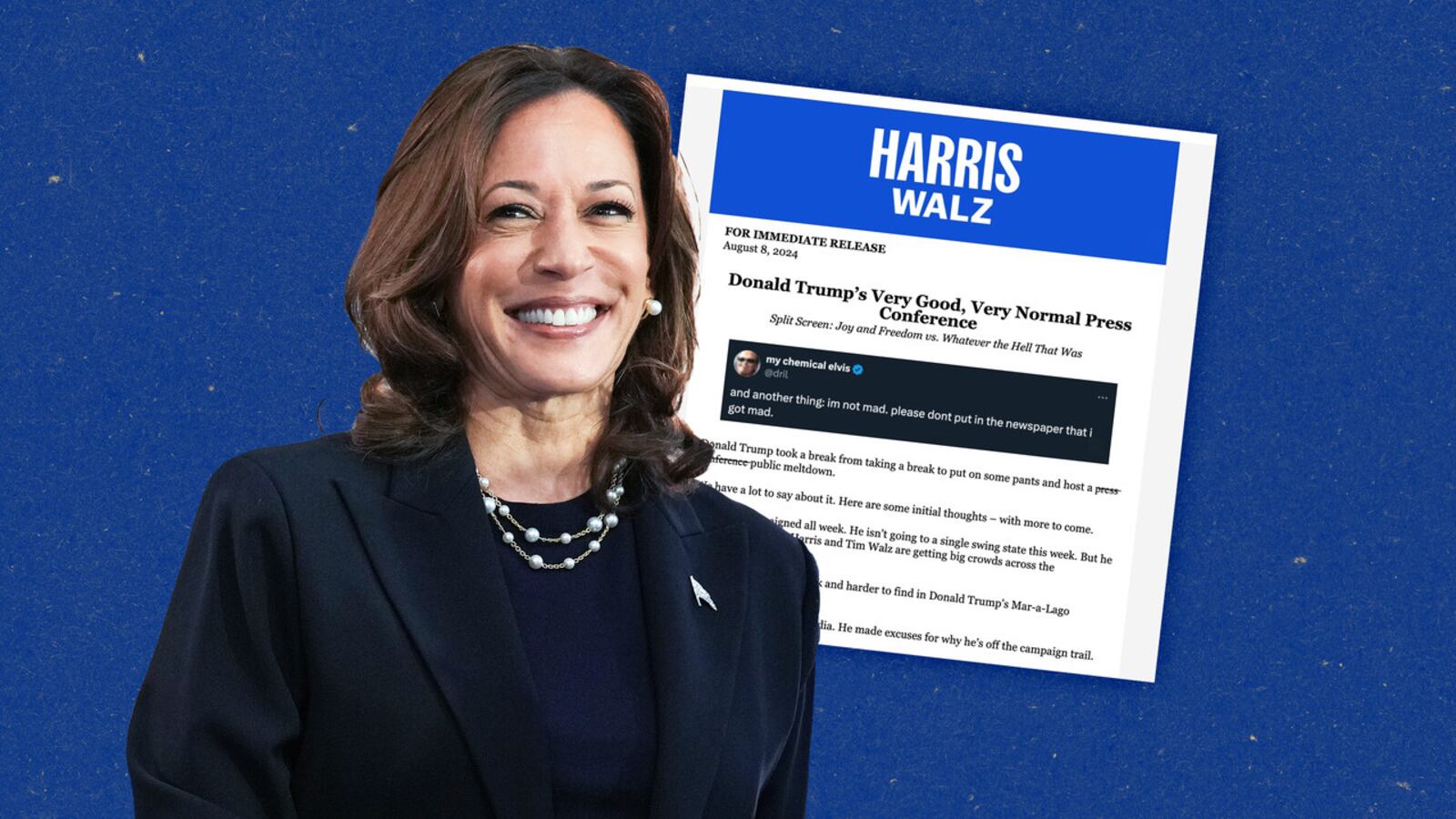On Thursday, Kamala Harris’ presidential campaign attached a viral tweet to a press release and hit send.
The press release didn’t just criticize or condemn Donald Trump for the chaotic news conference he’d hosted hours earlier, in which he ranted, raved, and foamed at the mouth about how big his crowds are, as compared his rival’s—it trolled him. There’s an important distinction.
“Donald Trump’s Very Good, Very Normal Press Conference,” it trumpeted, going on to mock him for “[taking] a break from taking a break to put on some pants and host a press conference public meltdown.”
Above that was a screenshot of a 2014 tweet posted by @dril, an infamous X user known for firing off absurdist non sequiturs, also known as s--tposts. “and another thing: im not mad,” the tweet read. “please dont put in the newspaper that i got mad.”
There’s been a subtle but noticeable change in messaging ever since Harris took over as presumptive (now confirmed) Democratic presidential nominee. That tone adjustment—call it a vibe shift—has seemingly caught Republicans off guard. Their flat-footed attempts to counter it have, thus far, all fallen flat, resembling in substance nothing so much as another @dril tweet: “‘im not owned! im not owned!!’, i continue to insist as i slowly shrink and transform into a corn cob.”
Beginning with the 2016 election, the domain of trolling and s--tposting became the staked claim of a certain vocal subsection of the Republican Party. The Democrats, meanwhile, generally preferred to exercise the kind of long-suffering restraint best epitomized by Michelle Obama’s “When they go low, we go high” motto. As a result, Trump rode into the White House on a wave of far-right memes.
But Democrats, no doubt bolstered by a new guard of internet-savvy Gen Z aides and interns, have finally caught on: In the age of the attention economy, the ability to dunk on one’s opponent, preferably over and over again, is a key political strategy. If that means trolling or even s--tposting—the act of posting deliberately provocative material to upset others or derail discussions—so be it.
The Harris campaign has also harnessed other, more refined digital strategies, from organizing mass Zoom calls to securing the endorsements of pop cultural icons to reclaiming the camo hat. But Democratic trolling has also reached unprecedented levels.
First and foremost, there’s “weird.” The (probably, but not provably, false) claim that Trump’s running mate, Sen. J.D. Vance, once had sexual relations with a couch. The Abby Lee Miller edits. The @dril s--tposts, which have been part of the campaign’s official messaging for at least a week now.
Dril, an anonymous internet personality even acknowledged the Harris campaign’s most recent use of their work, seemingly denouncing the Thursday press release by quote-tweeting a screenshot of it along with the caption: “in case you thought IDF Rape Camps were the worst thing our government is sanctioning,” a reference to recent allegations that Israeli soldiers sexually assaulted Palestinian detainees at a military base.
It’s also crucial that none of these memes have come from Harris herself. Another cardinal rule of political trolling: The candidate herself must never be seen stooping to do her own meme-ing. As Variety critic Alison Herman counseled Harris just as the KHive, as her online hordes of fans are known, came back to life: “do NOT acknowledge the coconut memes… the children will turn on you.” (Trump, for all his weird asides and unhinged posts, also understood this, and never became a full-blown s--tposter in his own right.)
But Harris has her official campaign to do her trolling for her. “Low energy, @realdonaldtrump?” it teased in a recent tweet, posting a list of Harris’ many campaign stops planned for the week alongside the former president’s single rally. (The campaign also chose an all-timer of a bad photo of Trump for the graphic.)
She also has her running mate, Minnesota Gov. Tim Walz, the dad-vibes king (or, to use the internet’s term, Midwest princess) of dunking on Republicans. His is a light-touch, unforced style of trolling. He effortlessly popularized calling Trump and Vance “weird,” and made a sly couch joke at a rally appearance in Philadelphia earlier this week—as Harris visibly struggled to contain her laughter behind him.
Other pro-Harris groups have gamely followed suit, with one super PAC putting out a viral ad late last month in which a pack of leering, increasingly sweaty “Republicans” talk about wanting to get “way more involved” with voters’ genitals.
The result of all this trolling has been beyond any liberal strategist’s wildest dream. Turns out Trump and the rest of MAGA World can dish it out, but they can’t take it, they believe. And the latest polls have shown the vice president steadily gaining on and, as of Thursday in one poll, overtaking her rival.
Trolling, as it turns out, might just have the potential to be a winning strategy. But the Democrats have to continue to walk a careful line. To paraphrase a popular internet meme, s--tposting requires a clarity of purpose and target for its impact to have maximum effect. In other words, it can’t just fall out of a coconut tree, devoid of context. It requires finesse. Direction. A certain elegance.
So far, it appears Harris’ campaign has all that in spades.
You do kinda, under these circumstances, “gotta hand it to them.”







